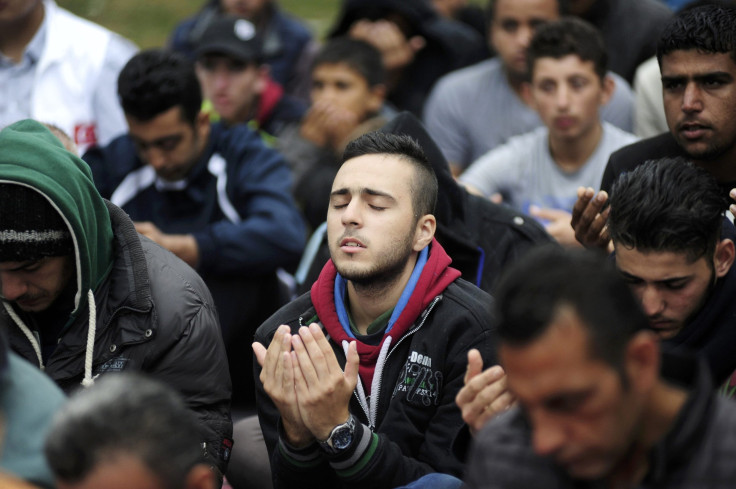EU 'Ring Of Friends' Turns Into Ring Of Fire

BRUSSELS (Reuters) - The European Union's dream of building "a ring of friends" from the Caucasus to the Sahara has turned into a nightmare as conflicts beyond its borders send refugees teeming into Europe.
In contrast to the success of its eastward enlargement drive that transformed former communist countries into thriving market democracies, the European Neighbourhood Policy launched in 2003 has been a spectacular flop.
It offered money, technical assistance and market access, but not membership, to 16 countries to the east and south in return for adopting EU democratic, administrative and economic norms.
"As we look at the situation now, it is difficult to avoid the conclusion that we are surrounded not by a 'ring of friends' - but by a 'ring of fire'," former Swedish prime minister Carl Bildt said earlier this year.
The failure to stabilize or democratize the EU's surroundings was partly due to forces beyond Brussels' control: Russian resentment over the collapse of the Soviet Union, as well as political and sectarian strife in the Middle East.
Five of the six Eastern Partnership countries - Ukraine, Moldova, Georgia, Armenia and Azerbaijan - are weakened by unresolved "frozen conflicts" in which Moscow has a hand. The sixth, Belarus, is so authoritarian that it is subject to EU sanctions and has eschewed the offer of a free trade deal.
EU officials now acknowledge that the framework designed to engage and transform the bloc's neighbors was flawed from the outset due to a mixture of arrogance and naivety.
"The idea was to have a ring of friends who would integrate with us but not become EU members. That was rather patronizing, with the European Union telling everyone what to do because we believed they wanted to be like us," said Christian Danielsson, head of theEuropean Commission department for neighborhood policy and enlargement.
WRONG ASSUMPTIONS
The EU approach offered too little reward tied to too many conditions, with intrusive monitoring that authoritarian rulers and local oligarchs from Minsk and Baku to Cairo andAlgiers instinctively resisted as a threat to their interests.
It set out a one-size-fits-all relationship for states with widely diverse levels of economic development and governance, most of which are ill-equipped to apply swathes of EU market, environmental or health and safety legislation.
And it assumed that groups of countries in North Africa or the south Caucasus would cooperate and trade with each other, when in reality they had little or no desire to work together.
Now the EU neighborhood policy is undergoing a fundamental rethink, with a more modest, flexible and differentiated approach due to be unveiled on Nov. 17.
Whether it will prove more effective remains to be seen.
Ian Bond, a former British ambassador now at the Centre for European Reform, called the current policy a "mess of inconsistency and wishful thinking".
The last review in 2010-11 had urged a focus on promoting "deep and sustainable democracy", he noted. Yet since then two countries - Libya and Syria - had fallen into near anarchy, one - Egypt - had had a military coup, and repression of civil society and the media had worsened in several, including Azerbaijan, Bond said.
Among the few relative success stories, Tunisia, Ukraine and Georgia remain vulnerable to internal and external threats, while privileged economic ties have not made Israelreceptive to EU efforts to promote a two-state solution with the Palestinians.
NEW REALISM
EU officials talk of the need for a new realism, putting the pursuit of common interests with partners ahead of lecturing them on human rights and democracy.
But the European Parliament and member states such as Germany and the Nordic countries will be loath to soft-pedal promoting such values.
Bildt, for example, argued that "our concern for the stability of the day must not block our urge to respect the human rights that in the long run are an essential precondition for the stability that we are seeking".
Some experts say the EU's offer of so-called "Deep and Comprehensive Free Trade Agreements" was unrealistic and is destabilizing for neighbors' economies, because it requires them to open up their markets to EU competition before they have much to sell toEurope.
Yet EU officials say Ukraine and Georgia, which sealed such deals with Brussels in defiance of Russian opposition, should press ahead with them to anchor economic development.
Michael Leigh, a senior adviser at the German Marshall Fund think-tank and former head of the EU's enlargement department, said Brussels had responded to the 2011 Arab Spring uprisings by offering a "top-heavy, long, cumbersome, demanding" DCFTA process rather than swift but limited market access.
It would be better to offer countries like Morocco and Tunisia an immediate end to restrictions on agricultural produce such as oranges and tomatoes, he said, but farm interests in EU countries such as France, Spain and Italy got in the way.
The reality is that the EU's urgent need to contain and manage the influx of hundreds of thousands of refugees from the Middle East, Asia and Africa is likely to take precedence over all other priorities in dealing with the neighborhood.
That means Brussels will divert money earmarked for economic development and administrative reform to fund facilities to keep refugees in place and discourage them from pouring into Europe.
The ring of friends will have to wait for better times. For now, what the EU wants are flood defenses.
(Additional reporting by Robin Emmott; Editing by Mark Trevelyan)
© Copyright Thomson Reuters 2024. All rights reserved.





















